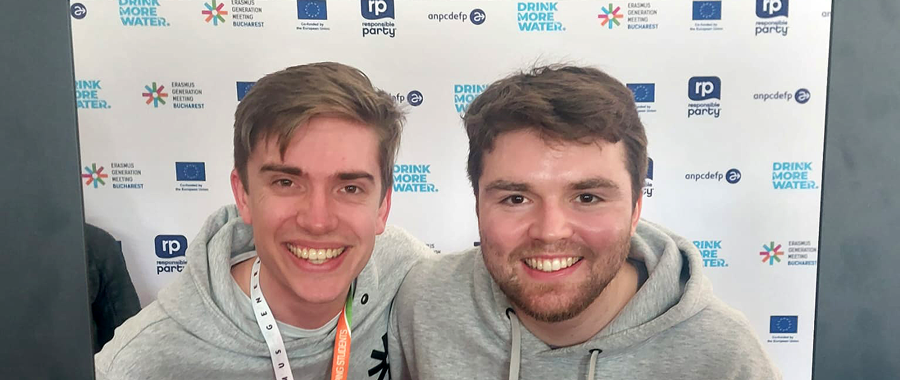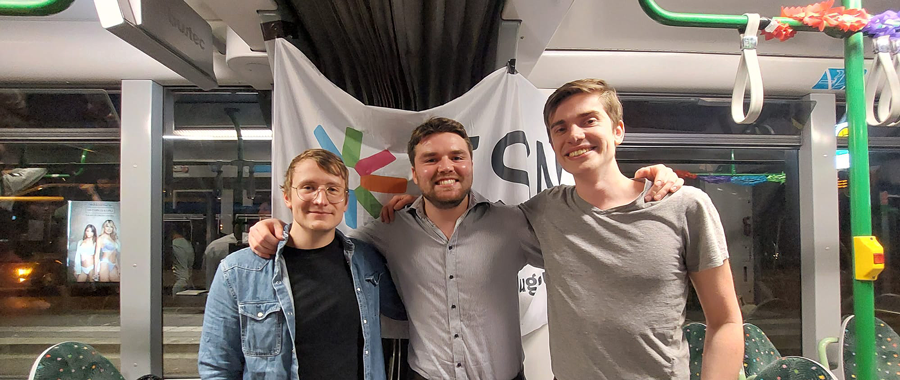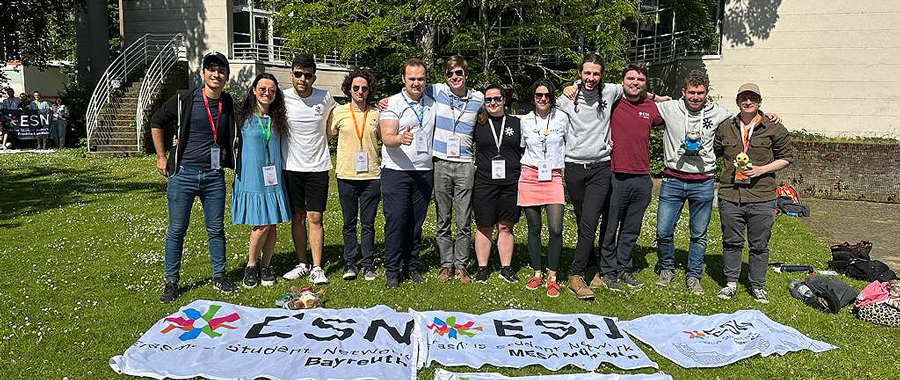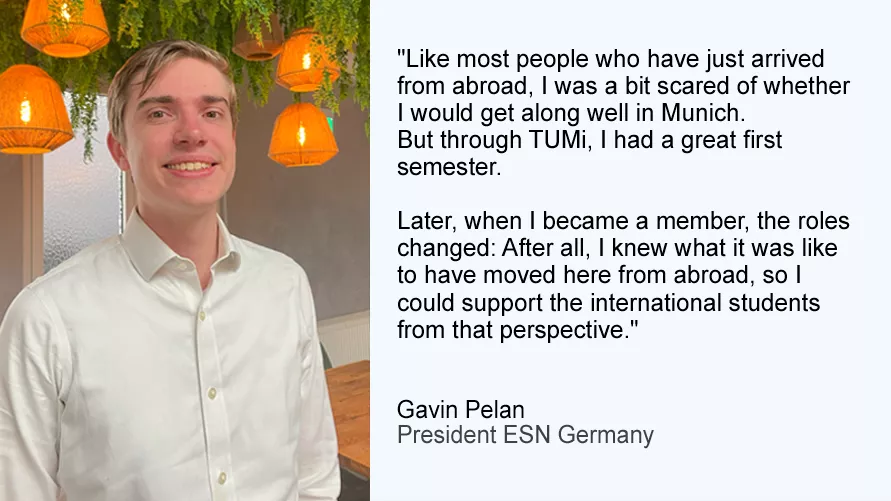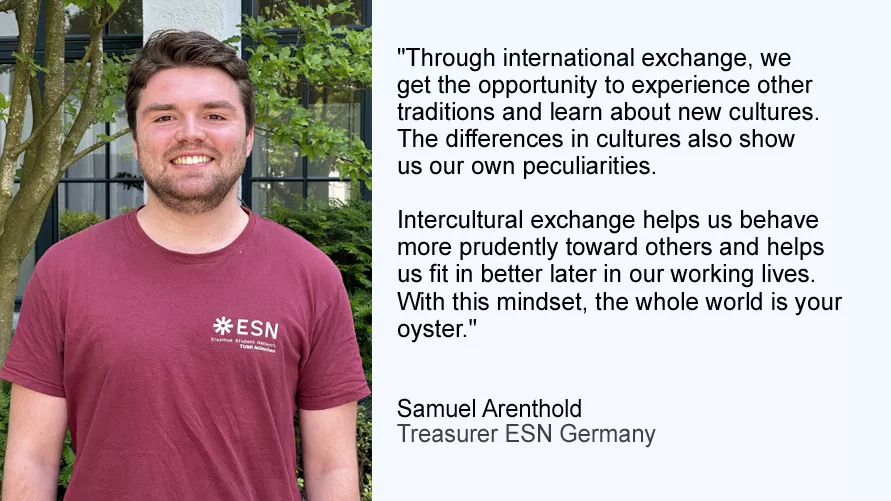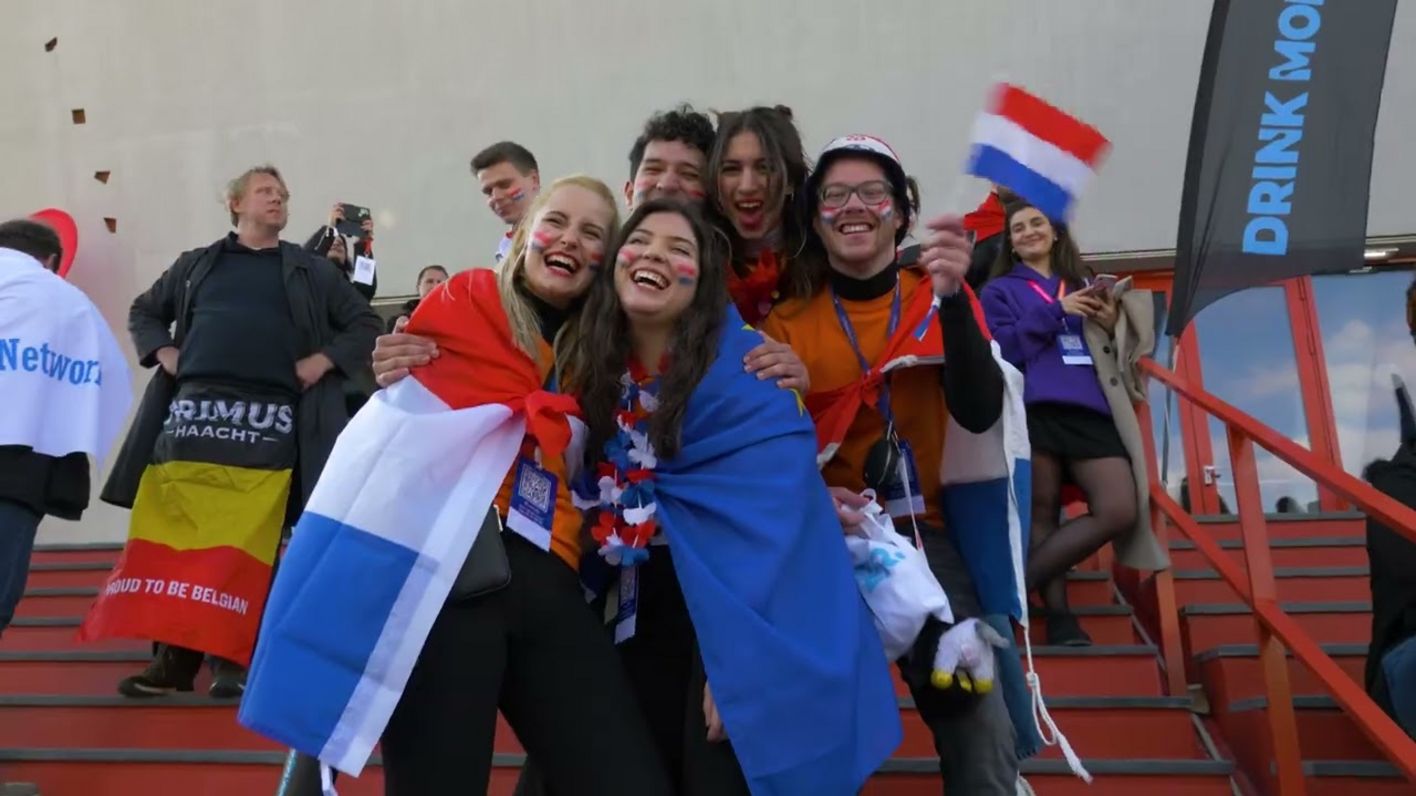Gavin Pelan and Samuel Arenthold have been committed to the ESN TUMi e.V. association, which particularly offers support and orientation to foreign students, since their studies at TUM began. Both have an international background themselves and know how well students can help each other in a new environment – and how valuable intercultural exchange is for our togetherness. In July, the two also started advocating for international students on a volunteer basis at the national level: as president and treasurer of ESN Germany.
Gavin, Samuel – First of all, thank you for your incredible commitment to your fellow students! What did your path look like before you came to TUM? Are there any international aspects to your personal background?
Gavin: I grew up in the Netherlands, and my parents are from the Netherlands and Northern Ireland. Maybe that's why I've always felt a certain wanderlust in me. During my bachelor studies in Amsterdam, I did an exchange to Singapore. There, I decided that I would do the master's full-time abroad. For full-time study, I preferred to stay a little closer to home. The following steps to TUM then happened pretty quickly. At TUM, I met two students from Singapore again, and with acquaintances, it is easier to feel at home.
Samuel: I spent much of my childhood in different countries and cultures and grew up in a multinational environment. During my bachelor's degree in Dortmund, I slipped into the friend groups of international students right in the first semesters, mainly because of my bilingualism. After participating in some ESN events, I decided to join the association. One of my better decisions!
How did you find out about TUMi? And why did you want to join?
Samuel: Based on my positive experience with ESN, I immediately saw TUMi as a nice way to find friends with similar interests in a new city. So, I applied to be a member of TUMi as soon as I moved and then quickly started participating in my first events.
Gavin: Most members find out about TUMi when they return from their exchange. Even the friends I mentioned earlier joined after their Singapore exchange and took me to the events. Thus, I quickly established contacts among international students in Munich. Later, I became a member and also part of the board.
What kind of experiences at TUMi are unforgettable?
Samuel: One event that sticks in the minds of the exchange students and myself is our orientation week format, "Party Animals". This is the first opportunity for exchange students to get to know each other and for the new club members to immediately familiarize themselves with TUMi. The excursions are also something we always remember fondly. For example, we took 40 to 50 people on trips to huts in the surrounding area and once went swimming in the Ammersee in November. On such occasions, you get to know each other exceptionally well.
Why would you recommend any student to join TUMi?
Gavin: TUMi provides the opportunity to meet many people in an international environment. When you help international students during their stay in Munich, you become part of a circle of friends with people from all over the world. Many local students have found their connection to Munich's student life here.
Samuel: ESN and, therefore, TUMi generally offer an optimal platform for further self-development. You get to know many foreign cultures and people while meeting people from your country with a similar open attitude. You also learn to work and get along with each other. And all this while having fun! It's a really good feeling to feel that you've helped people find their footing in Munich. And it's just great to meet the groups of friends that have formed on campus due to your work.
Why is international exchange and intercultural understanding so important?
Gavin: Each person brings their own experience, history, and opinion, partly shaped by their environment. It's always important to engage in dialogue with others to better understand your point of view and adjust where necessary. That is why communicating with people outside your bubble is even more critical. Every exchange student contributes to making the environment at the TUM as diverse as possible and offers us all the chance to learn from each other. International exchange and intercultural understanding lead us to work together toward a more tolerant future.
After joining TUMi, what motivated you to also get involved in the TUMi board?
Samuel: The longer I was active in the association as a member, the more I felt the need to strive for bigger goals, which not only concern an event but also the association as such. Many of the ideas you gather as a member can be incorporated more extensively. Also, I have seen the board position as an opportunity for self-development that exposes me to many problems and challenges one would not otherwise encounter in everyday life.
Gavin: It was the motivation to give back to exchange students, the help, support, and a sense of belonging that TUMi gave me at the time. Along with international students, the other members became more important to me as well. We became friends. And when my mate decided to join the board, I wanted to do the same.
What exactly did you do on the TUMi board?
Samuel: I spent my year on the board as treasurer. Here, I primarily took care of revising and automating our accounting. I also had to deal intensively with our taxes during this time. In addition to the financial work, there was also some board work in other areas, especially in the context of restructuring and goal realization. As a final project, I have started to extend the reach of TUMi beyond TUM to other universities. In this way, I hope to create an even more diverse life with people from various fields of study within Munich at TUMi.
Gavin: I took on a role on the extended board of TUMi last year. My primary role has been liaison with other associations in the Erasmus Student Network, of which TUMi is one. Similar associations have similar challenges, and we could always learn well from each other during joint calls and meetings. In addition, I have taken over or supported many smaller tasks of the board. That means having a say in decisions about the direction we want to go in. It was very fulfilling to see how the association changed as a result of our work.
What made you decide to take the next step and apply for a position on the national board of ESN Germany?
Samuel: I complained for a long time about the current state of ESN Germany. This was followed repeatedly by the statement: "Why don't you try doing it yourself then?" I took this to heart and subsequently applied for the position of treasurer. As a national board member I have many more opportunities to represent even more significant projects and interests. I see a lot of potential in ESN at the local and national levels and want to take advantage of that as much as possible.
Gavin: During my year on the board at TUMi, my interests have gradually shifted from events for exchange students to representing exchange students. With a local association, there are opportunities there, but at the level of a national umbrella organization, you can do more. For example, you have contact with the DAAD and can bring the problems of exchange students directly to the right people.
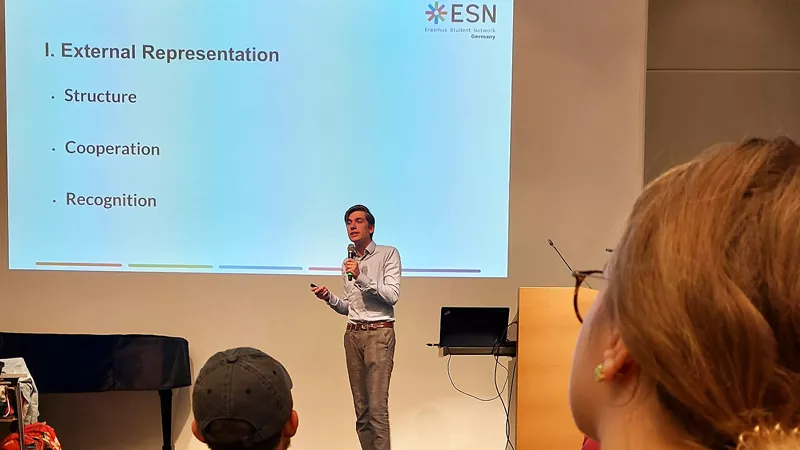
What do you intend to achieve during your term of office on the ESN Germany board?
Samuel: I particularly want to improve the outdated accounting structures. Everything was handled in paper in the past, and I am now working on digitizing all processes. In addition, I plan to give the local treasurers a better basis in the form of training and templates to make it easier to learn the ropes.
To further improve ESN Germany and offer even more to exchange students, I am also trying to establish income streams such as a merchandise store on a national level, that is accessible to all ESNers. Finally, I want to help ESN gain more influence on everyday life in Germany through national projects. Needless to say, fun is always a part of all this!
Gavin: I plan to strengthen the contact between ESN Germany and certain institutions like the DAAD or the German Rectors' Conference (HRK) and work together on some projects until the end of June 2024. As ESN, we had a Europe-wide survey this summer, and we would like to analyze the data to see where exchange students most need help from universities and then make universities aware of that.
I would also like to advocate for students at German universities to receive better recognition of study credits after their exchange. In theory, you should be able to have all 30 ECTS that you have taken abroad recognized. Last but not least, I would like to see more recognition for students who do voluntary work or are even on the board of an association – to enable many more to share the same learning experiences and developments alongside their studies.
Thank you both for the interview!
This interview was originally conducted in German.
